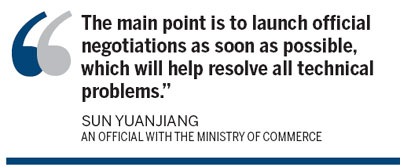'Barriers must fall' for trilateral trade
 0 Comment(s)
0 Comment(s) Print
Print E-mail China Daily, April 6, 2012
E-mail China Daily, April 6, 2012

China, Japan and South Korea should dismantle barriers to a proposed trilateral free trade agreement, which will benefit all involved, the Ministry of Commerce said.
The countries constitute an increasingly important part of the global economy: China is the world's second-largest economy, while Japan is the third-largest, and South Korea - while much smaller - has deep business ties with both.
"Driven by a political consensus, the three nations have made great progress on establishing a China-Japan-Republic of Korea free trade agreement within the past two years.
"Now it's time for the governments to stand up to ... accelerate regional economic integration in Asia," Sun Yuanjiang, deputy director of the international department of the ministry, said.
The ministry said China, Japan and South Korea will finalize and announce the timetable, form and procedure of the tripartite talks in May.
The tripartite agreement, proposed in 2002, has been held up by domestic concerns in each country. The industrial sectors in all three are worried about opening up their markets to foreign competition.
"The main point is to launch official negotiations as soon as possible, which will help resolve all technical problems", said Sun, China's chief negotiator for the pact.
Market opening and lower tariffs "will make an impact on industries that lack international competitiveness in each country, as the industries of China, Japan and South Korea are highly converging, complementary and competing," Sun said.
"While Japan and South Korea are concerned about opening their agricultural sectors, China, which has the lowest level of industrialization of the three nations, has too many areas to worry about", Zhang Yunling, director of the division of international studies at the Chinese Academy of Social Sciences, said.
Sun said regional economic integration is inevitable and the three nations should promote their domestic industries' international competitiveness.
A top priority in China's 12th Five-Year Plan (2011-15) is industrial and technological upgrading to promote international competitiveness.
"Both Japan and South Korea should also strive to reform their economic structures to deal with challenges from economic globalization and regional integration," Sun said.
He said further discussions were needed to open up the service, intellectual property and investment sectors.
Last month, Japan, China and South Korea signed a trilateral investment agreement, moving one step toward a full trade agreement. China has a trade China is now the largest trading partner of Japan and South Korea.
China is expected to increase imports from both Japan and South Korea, and the world's largest exporter is seeking to cut its reliance on export-driven growth amid difficult conditions in the US and Europe.
Wang Shouwen, director of the ministry's department of foreign trade, said China will strive to raise imports from countries that have signed trade agreements with China.
"Following the establishment of a free trade zone, there will be huge potential for trade development among the three countries," Sun said.
For China, Japan and South Korea, trilateral trade only accounts for 11 percent of the three countries' total foreign trade, according to the ministry.
"China's growth has helped Asia, shifting Asian growth from quantity to quality."
"If international trade resources can be combined into a complete industry chain, each party will enjoy trade-driven economic growth," Xu Jin, a financial commentator, said in an article in the Financial Times.






Go to Forum >>0 Comment(s)